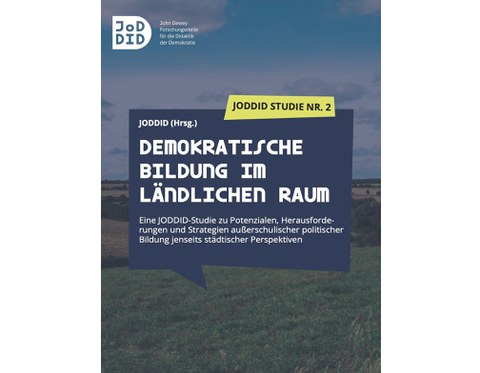11.04.2024
JoDDiD legt Studie zu demokratischer Bildung im ländlichen Raum in Sachsen vor
„Anders als in der Stadt kann man sich nicht aus dem Weg gehen.“
Besonders in diesem Wahljahr ist die politische Bildung in den ländlichen Gegenden Sachsens ein vieldiskutiertes Thema. Wie Jugendzentren, Vereine und andere Akteur:innen der politischen Bildung arbeiten, welchen Herausforderungen sie sich stellen müssen und welche Möglichkeiten es für die Bildungsarbeit noch gibt, haben nun Wissenschaftler:innen der TU Dresden erstmals in einer systematischen Studie untersucht. David Jugel und Celina M. Hertel, Wissenschaftler:innen an der John-Dewey-Forschungsstelle für die Didaktik der Demokratie (JoDDiD), haben sich bewusst dafür entschieden, in ihrer Studie den ländlichen Raum mit seinen spezifischen Potenzialen, Herausforderungen und Strategien außerschulischer politischer Bildung jenseits städtischer Perspektiven in Sachsen zu untersuchen.
Politische Bildung findet in Sachsen in ganz unterschiedlichen Kontexten und Settings statt – im Fokus von Wissenschaft und Förderstruktur stehen dabei bisher vor allem die Städte. Um diesen etwas eingeschränkten Blick zu erweitern, erarbeiten die Autor:innen durch eine qualitative Analyse systematisch die besonderen Herausforderungen, denen sich politische Bildung im ländlichen Raum stellen muss. Zugleich werden auch Potenziale und Lösungsstrategien des Feldes dargestellt und aus einer fachdidaktischen Perspektive betrachtet. Im Sinne des partizipativen Forschungsansatzes der JoDDiD wurden im Rahmen der Studie sächsische Akteur:innen aus der Praxis interviewt und in einem Werkstattgespräch in einen Austausch gebracht.
„Als zentrale Themen haben sich die Unterstützung und der Schutz der handelnden Akteur:innen vor Angriffen, der Bedarf an passenden didaktischen Strategien, die Förderung von Handlungssicherheit sowie langfristige Finanzierung der demokratischen Bildungsarbeit herausgestellt“, erklärt die Autorin Celina M. Hertel. David Jugel, ebenfalls Autor, fügt hinzu: „Besondere Bedeutung haben die Beziehungsstrukturen im ländlichen Raum, denn anders als in der Stadt, kann man sich hier nicht aus dem Weg gehen. Es hat sich gezeigt, dass politische Bildung im ländlichen Raum vor allem dann gelingt, wenn Projekte und Akteur:innen eine gute Beziehung zur Bevölkerung sowie kommunaler Politik und Verwaltung aufbauen und mit innovativen Konzepten im alltäglichen Leben der Menschen verankern konnten. Ein solcher Prozess braucht jedoch mehrere Jahre und gut qualifiziertes Personal.“
Prof.in Anja Besand, Direktorin der JoDDiD, ergänzt: „Diese erste systematische Analyse zum Handlungsfeld der politischen Bildung in ländlichen Räumen in Sachsen ist ein wichtiges Instrument, die Passfähigkeit der Förderinstrumente seitens des Freistaates und der Kommunen zu untersuchen. Damit leistet die JoDDiD einen zentralen Beitrag zur Qualifizierung der politischen Bildung in Sachsen.“
Die John-Dewey-Forschungsstelle für die Didaktik der Demokratie lädt die Akteur:innen und Träger politischer Bildung ein, in einem anregenden Austausch und mit forschendem Blick politische Bildung im ländlichen Raum mit ihren spezifischen und zeitgenössischen Herausforderungen zu reflektieren.
Weiterführende Informationen:
Studie:
Demokratische Bildung im ländlichen Raum – eine JODDID-Studie zu Potenzialen, Herausforderungen und Strategien außerschulischer politischer Bildung jenseits städtischer Perspektiven (https://tud.link/nkuzv7)
Kontakt:
David Jugel
John-Dewey-Forschungsstelle für die Didaktik der Demokratie (JoDDiD)
Tel.: 0351 463 41143
John-Dewey-Forschungsstelle für die Didaktik der Demokratie:
www.joddid.de
JoDDiD Instagram: @joddidforschungsstelle
JoDDiD YouTube: @joddidforschungsstelle5387
EINFACH GUT GEMACHT – neue Wege, unentdeckte Lernorte und erfrischende Formatideen für politische Bildung: https://einfachgutgemacht.joddid.de
Die John-Dewey-Forschungsstelle für die Didaktik der Demokratie (JoDDiD)
Die John-Dewey-Forschungsstelle für die Didaktik der Demokratie versteht sich als Innovationszentrum im Feld politischer Bildung und hat die Aufgabe, neue Formate, Methoden und Vermittlungskonzepte zu erforschen, fortzuentwickeln und sichtbar zu machen. Sie unterstützt damit sächsische Akteur:innen der außerschulischen Bildung bei der Vorbereitung, Neuentwicklung und reflexiven Bewertung von Angeboten zur politischen Bildung vor dem Hintergrund einer herausfordernden gesellschaftlichen Lage. Der Fokus der Forschungsstelle ist in diesem Zusammenhang insbesondere auf den Bereich der außerschulischen politischen Jugend- und Erwachsenenbildung gerichtet. Perspektiven schulischer politischer Bildung sind nur relevant, wenn sie mit außerschulischen Bildungsträgern in Beziehung stehen. Die John-Dewey-Forschungsstelle für die Didaktik der Demokratie schließt damit im Kontext des fachlichen Austauschs der (außerschulischen) politischen Jugend- und Erwachsenenbildung die Lücke zwischen akademischer Infrastruktur und pädagogischer Bildungspraxis.

